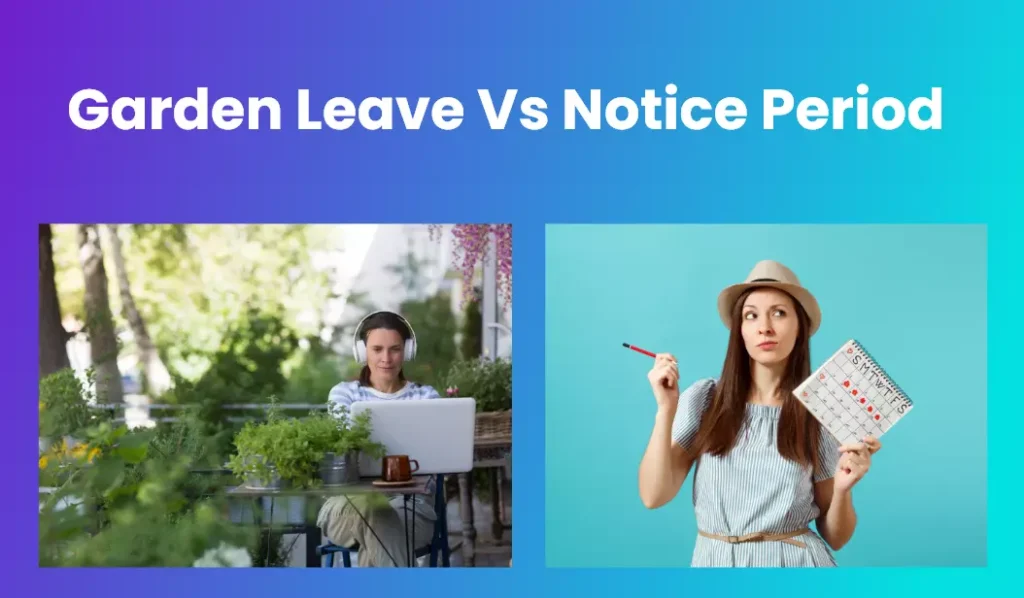What is Garden Leave UK? A Comprehensive Guide
Whenever a person leaves a job, whether, by choice or dismissal, there is always a notice period before the last day of employment; notice period and garden leaves are the terms that can be set out differently for each person and often depend on the estimated replacement time, training and the sensitivity of the data that need to be handled during the notice period.
It rarely happens that the employees leave immediately after handing in their notice period. As an employee, leaving a job can be daunting, filled with uncertainty and negotiation. One crucial factor is whether to go on garden leave or serve a notice period.
In this article, we will delve into the definitions and advantages of each option so that you can understand which one is the right option for you.
What Is A Garden Leave?
Garden leave is when an employee is still under contract but is not required to come to the workplace or perform tasks. During this period, that employee will receive full pay and benefits.
However, the employees on garden leaves cannot work for any other company.
This type of leave is called garden leaves because employees are not allowed to work, and they can focus on housework or gardening.
Where Does The Garden Leave Term Come From?
Garden leaves originated in the 1980s from the financial and civil service sector. When an employee resigns or is notified to leave the job through redundancy, the employer will choose the employee on garden leave.
What Are the Rules on Garden Leave?
Employers use a business strategy to protect their business interests, such as sensitive information and clients, while an employee transitions to a new role.
We can say that the employee is still bound by the express and implied to their contract terms, which means they remain an employee during the notice period, but they are not allowed to:
- Perform any task or service for the company unless specifically asked to do anything.
- Use any equipment of the company
- Attend any business premises of the organisation
- Have any contact with the other employees, clients, suppliers or other business contacts.
In return, your employer will maintain all your contractual benefits, including salary, flexible benefits and holiday accruement during garden leave.
Lets Take an Example
Suppose an organisation intends to include Garden Leave clauses in its employment contracts. In that case, they should be aware that the period of Garden Leave cannot exceed the employee’s usual notice period. Moreover, if the notice period is longer than six months, an Employment Tribunal may rule that it is excessive and unnecessary to protect the business’s interests.
Therefore, it is recommended that any organisation considering Garden Leave clauses seek legal advice before implementing them in their employment contracts.
Some organisations also use garden leaves to use the employee to complete a special project away from the workplace with little or no contact with other employees.
What Does UK Gov. Say About Gardening Leave?
Gardening leave is a term used to describe a situation where an employee must stay away from work during their notice period or after resigning. Although on gardening leave, the employee remains employed by the company but is not required to perform their regular duties.
The UK government's official website, gov.uk, provides employment rights and regulations information. However, the specific details and guidelines regarding gardening leave may not be explicitly covered on the website. The information we found on this website about gardening leaves is that it depends on your employer whether you will work from home or another location during the notice period.
However, you will get the same benefits and salary during this notice period. It means that your employer decides all the policies, terms, and conditions of gardening leaves.
When Should Garden Leaves Be Used?
If you want to use Garden leaves as a part of your employee exit strategy, you should ensure that you have stated this clause in the employee’s employment contract.
It is important to ensure the employees are fully aware from the start of their employment with the organisation that in case they resign or be dismissed from their job, the organisation may implement garden leave for a specific part or all of their notice period. It does not mean the company needs to use this strategy for every employee who serves a notice, but they can do so whenever required.
Typically, companies implement this exit strategy in the following situations:
- When that employee is at a senior management level and whose exit can impact the decision-making and strategic direction of the organisation during the notice period.
- When an employee has worked with loyal clients, there is a risk of personally enticing these clients to move their business elsewhere.
- If the employee has access to business sensitive information that they may use to establish their own business or provide this information to a competitor for their benefit.
- When there are chances that the employee may disrupt the workplace during the notice period.
Advantages And Disadvantages Of Garden Leave

Advantages of Garden Leave
- The main advantage of garden leave for employees is that it provides a break between jobs, allowing them to recharge and prepare for their next role without work stress.
- On the other hand, employers benefit from protecting their business interests and reducing the risk of intellectual property theft or client poaching.
Disadvantages of Garden Leave
- For employees, it may feel like a waste of time, and they may struggle with boredom or lack of stimulation during the period.
- Employers may also incur additional costs by paying the employee’s salary without their contributions to the company during that time.
Can An Employee Refuse Garden Leaves?
- If an employer places an employee on Garden Leave without an explicit provision in the employment contract, it could be considered a breach of contract.
- However, Employment Tribunals cases have generally ruled that there is no implied contractual right to work, only a right to receive payment. Therefore, if an employee refuses Garden Leave, the employer may find the employee breaching the contract.
- It is recommended that employees seek legal advice before making any decisions in such cases.
- When an employee resigns and requests to be placed on Garden Leave, the employer can refuse this request.
- However, it may be advantageous for the employer to agree to this arrangement as part of the exit negotiations, as it can help minimise disruptions in the workplace.
What Is the Notice Period?
The notice period is when an employee has to work between announcing their resignation and leaving their job. The notice period is usually mentioned in an employment contract and can be from a few weeks to several months.
During this time, the employee is expected to continue working as usual and assist in transitioning their duties to another employee.
The notice period is set out in the employment contract and varies depending on the type of job and seniority of their role.
Advantages and Disadvantages Of Notice Period
Advantage of a notice period :
- For employees is that it provides a clear timeline for transitioning out of the company and a sense of closure.
- Employers benefit from the additional time to find a replacement or redistribute the employee’s duties, reducing the impact of their departure.
However, the notice period can also disadvantage :
- Employees, as they may be required to continue working in a potentially uncomfortable environment or where their role has already been filled.
- Employers may also risk losing an employee’s motivation or commitment during the period, which can impact productivity.
When Is A Notice Period Used?
Notice periods are commonly used when an employee resigns and is not going to work for a competing company or when the employer requires additional time to prepare for the employee’s departure.
Garden Leave Vs Notice Period

While both garden leave and notice periods serve the purpose of transitioning an employee out of a company, there are some key differences to consider.
- Garden leave provides a break for the employee, whereas the notice period requires employees to continue work till the last day of the job.
- Garden leave also protects business interests, while the notice period helps maintain business continuity.
Employers and employees should consider their priorities when deciding which option is best for them.
Legal Consideration
Both garden leave and notice periods have legal obligations for employers and employees.
- Employers must ensure that garden leave and notice periods are included in employment contracts and are reasonable in length.
- Employees need to adhere to any restrictions or obligations specified in the contract.
Things To Remember When Choosing Garden Leave Or Notice Period
Here are a few recommendations for employees and employers that can help them when considering garden leave or notice period:
1. Review Their Contracts
Employers and employees should review their contracts and prioritise their goals. Employers should consider the impact of the employee’s departure on the business and whether protecting business interests or maintaining continuity is a higher priority.
2. Consider Their Needs and Priorities
Employees should consider their needs and priorities, such as rest and preparation, versus maintaining a good relationship with their employer and colleagues.
Ultimately, deciding whether to go on garden leave or serve a notice period will depend on individual circumstances and should be made after careful consideration and discussion with all parties involved.
It is also important to seek legal advice to ensure that the employer and employee fulfil their obligations and rights.
3. Clear Instructions & Duties
Both employers and employees need to communicate effectively during the transition period.
Employers should provide clear instructions on how the employee’s duties will be redistributed and ensure that the employee has access to all necessary information and resources.
Employees should assist in the transition by completing any outstanding tasks and providing guidance to their replacement if needed.
Final Verdict - Garden Leave
In summary, both garden leave and notice periods can effectively transition employees out of a company. Employers and employees should carefully consider their priorities and circumstances before deciding which option to choose.
It is also important to adhere to legal obligations and maintain clear communication during the transition period.
Both parties can achieve a smooth and successful transition by approaching the process with transparency and respect.
